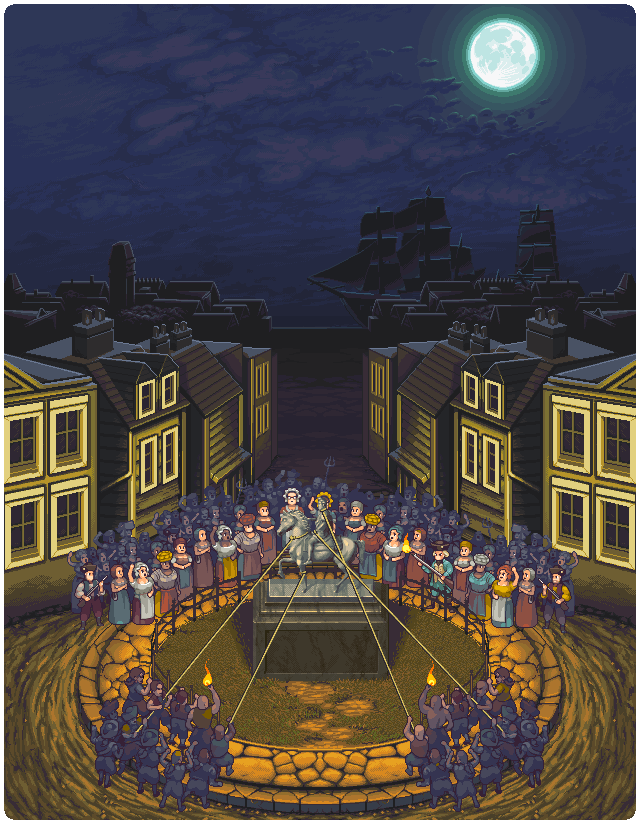Americana Dawn, a JRPG that combines folkloric Japanese animism with 18th century American history, looks like the most hypable exploration of colonialism since Sleepy Hollow premiered last fall. And that’s saying a lot.
Unlike most JRPGs (and all other colonial-themed media, actually), which often utilizes the hero’s journey template to engage players, the protagonist of Americana Dawn acts as much more of an interpreter of history rather than an actor. Foster, the spirit of the sea in a human form, witnesses some of America’s most defining moments and “does not set out the save or change the world. But rather, finds himself changed by the world.”
First appearing on Kickstarter two years ago as a basic but interesting concept built using RPGmaker, Americana Dawn returns now after an extensive makeover. After some difficult times for team manager and writer Max Lam (also known as “seltaire” on the internet), the game expanded rather than dissipated, with an entirely new team setting out to create a large scale adventure that blends two of gaming’s most influential cultures into one frilly frock-wearing package.
The game became a true passion project for Max during its long hiatus from the public eye, when she started taking up odd jobs to keep it going after the original $4,000 budget proved to be insufficient. Interestingly, she even took up a stint canvassing in California during the 2012 elections, which Max describes as a “disheartening experience, to work feverishly for a game that centers around people fighting for their rights and livelihood amidst a very apathetic electorate.”
But as George Washington said (and Americana Dawn‘s Kickstarter campaign quotes), “Perseverance and spirit have done wonders in all ages.”
Max says what kept her going was a deepened understanding of the game’s concepts. Originally, “18th Century America was pretty exotic to me. So at first, I was interested in Colonial America because I liked men in breeches, stockings and cravats,” she admits. But as Max began to research the myriad of cultures that made up America’s colonial era, she began to see a story that deserved to dive much deeper than her original vision allowed. Her inkling culminated on a trip to Santa Cruz, where, while on the Californian island, Max “read of a story about a princess who waged a civil war for the thrown. But when I arrived, there was nothing left of this civilization. I wondered what the princess thought of in her dying moments—was the war worthwhile?” Gazing into the pacific ocean, thinking of all those centuries of battles and human suffering that have passed since, Max thought, “What if the ocean had a soul? What would it think about time?” The thought birthed the concept of Foster, a spirit character that lives through several eras of America’s most tumultuous history.
Many of the characters in Americana Dawn derive from this kind of animism. Spirits of nature with souls and a corporeal form commingle with humanity throughout the ages in this version of colonialsm. But, despite the fantastical elements of the premise, “each one of these characters is interwoven with the local history of where they are from and interact with regular folk,” where they must then “find their purpose in order to finally rest, or else they will be unable to leave this world.”
The game approaches the fantasy through a type of magical realism lens, exploring the humanity that drives folklore as well as the historical events which propel the plot forward. At its core, Americana Dawn is not fantasy but rather “a story about human struggle. Many JRPGs are about world ending fiends and a small party of youths that will conquer them, whereas Americana Dawn is about the story of a runaway slave, a Lenape girl trying to defend her village from being swindled by encroaching colonists, settlers struggling with their identity and sense of loyalties.”
Even Foster, the centuries old water spirit, derives from one of literature’s most celebrated and realistic portrayals of human character: Mark Twain’s Huck Finn. “In some ways, Foster reminds me of Finn, with his naive good nature,” Max explains, also sighting Twain’s travel writing in Roughing It as inspiration for the depictions of sprawling American landscapes.

A lot of Max’s fascination with history centers around the less known accounts of major events, or the widely unheard stories of the common people and their struggle to survive in the midst of violent revolts. “I grew up without much exposure to American media and the traditional, more romanticized narrative of the American Revolution,” she says, which she countered by focusing her research on the very real accounts and memoirs of minority perspectives which are too often glossed over in history class. The more she read about their struggle, the more determine Max became to perservere to make a game worthy of their suffering. “When I think about these very real, plausible stories and how much hardship people in the past have endured,” Max says, “I think, surely I can work a little hard to create a videogame.”
You can find out more about Americana Dawn and donate on Kickstarter. Max imagines at least a one and a half to two year time period of production before launching. As of right now, the budget only covers a PC port, though the campaign promises to use any extra funds to make sure availability is more widespread.
